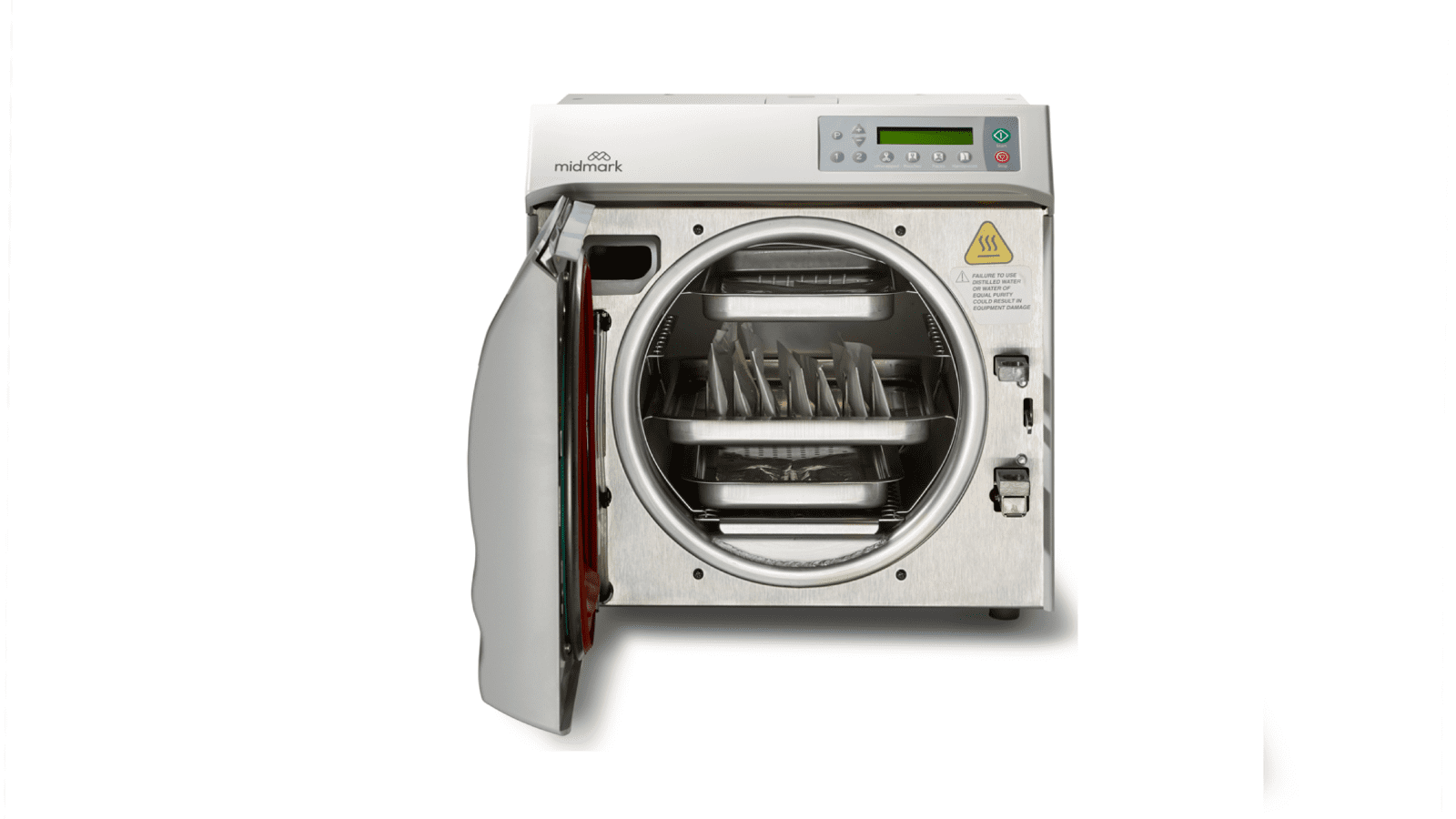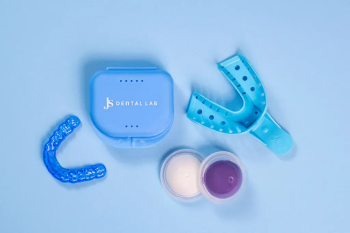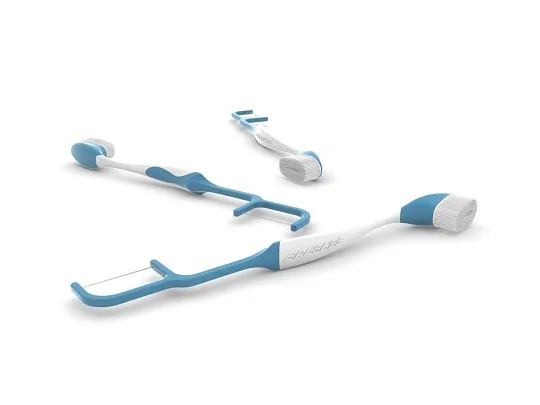The History of Autoclaves and How Steam Kills Germs
Dental sterilizers are imperative to a dental practice because regularly handling teeth make dental practices more vulnerable to infections and diseases. Because of the potential of spreading diseases, dental equipment will need a sterile form of cleaning capable of sterilizing the most stubborn stains and the most hidden crevices where bacteria can form. Autoclaves solve this issue by using either steam or dry heat to provide stable infection control.
BEST DEALS ON AMAZON
Autoclaves, initially invented in 1879 by Charles Chamberland, provided a more accurate and reliable source of sterilization. Before the invention of the autoclave, surgeons, and doctors used the open flaming method, which involved holding the instrument over an open flame to incinerate any moisture from the device. Heat, especially at higher temperatures, works to remove the potential of living organisms, including spores, from an object by the process of denaturation, where the structures of the proteins within living bacteria are disrupted and altered, causing the bacteria to die off. By the time the autoclave was invented, sterilization had become a much easier process. As the autoclave improved over time, newer methods, such as steam, became preferred for sterilizing equipment in quicker, larger quantities.
Steam is the primary autoclave sterilization agent that’s ideal for destroying microorganisms. Steam, because of its ability to heat more efficiently than dry air, causes coagulation, the process by which liquids turn into a semi-solid state. Because bacteria tend to carry more water, applying steam will allow those bacteria molecules to become solid. The moisture from the steam helps to transfer the heat easier and thus penetrates the bacteria, causing them to die off. With steam autoclaves, it’s a delicate balance. Still, the autoclave’s quality helps determine the quality of the steam produced and includes aspects such as moisture control and levels of non-condensate gases to produce optimal amounts of steam and, thus, increase the sterilization time for disinfecting equipment.
On average, autoclaves should be able to reach temperatures of 270° F to sterilize instruments and equipment completely. The disinfecting cycle can range from 6 to 30 minutes, depending on what is being sterilized. When searching for the best autoclave, some key questions you should think about include:
- What company manufactures the autoclave?
- What features does the autoclave offer?
- What volume of items can be sterilized?
- How will the autoclave function?
- Will this become a reliable investment?
Autoclaves have to meet the current national and international standards to be properly regulated and controlled for dental and medical use. Its features, which can range from how efficient it is at time-saving, what safety features it provides, and how much space it provides, are all features that should be considered when choosing an autoclave for your practice.
Table 1: Comparison of Numbers
| Model | Net32 Ratings | Price | Chamber Size (inches) | Number of Reviews |
|---|---|---|---|---|
| Midmark M11 UltraClave Steam Sterilizer | 5/7 | $6,699.00 | 11″ x 18″ | 7 |
| Tuttnauer ValueKlave 1730 Steam Sterilizer | 5/2 | $2,239.00 | N/A | 2 |
| Midmark M9 UltraClave Steam Sterilizer | 5/5 | $6,300.00 | 9″ x 15″ | 5 |
| Bader 12 L Class B Autoclave | N/A | € 2,443.19 | N/A | N/A |
| Mocom Supreme Closed Circuit Autoclave | N/A | € 5,197.50 | N/A | N/A |
Table 2: Comparison of Features
| Model | Chamber Size | Pre-programmed Cycles | Programmable Controls | Safety Features | Additional Features |
|---|---|---|---|---|---|
| Midmark M11 UltraClave Steam Sterilizer | Large | Yes | Yes | Steam-flush pressure removal system, reservoir drain and fills port | Designed with simple functionality and large capacity |
| Tuttnauer ValueKlave 1730 Steam Sterilizer | Compact | Yes | N/A | Dual safety thermostat, automatic shut-off | Colorful control panel and polished chamber for effective steaming |
| Midmark M9 UltraClave Steam Sterilizer | Sufficient | Yes | Yes | Steam-flush pressure air removal system, built-in CD display | Designed to maximize space and fight off infectious organisms |
| Bader 12 L Class B Autoclave | N/A | N/A | N/A | Microprocessor with a control system, regular self-diagnosis, quality sensor | USB port and self-drying cycle |
| Mocom Supreme Closed Circuit Autoclave | N/A | N/A | Yes | Internal filtration system, nano-ceramic re-circulation filter | 7″ touch display screen, incorporated WiFi system, USB port and memory card for system diagnosis and data collection |
1. Midmark M11 UltraClave Steam Sterilizer
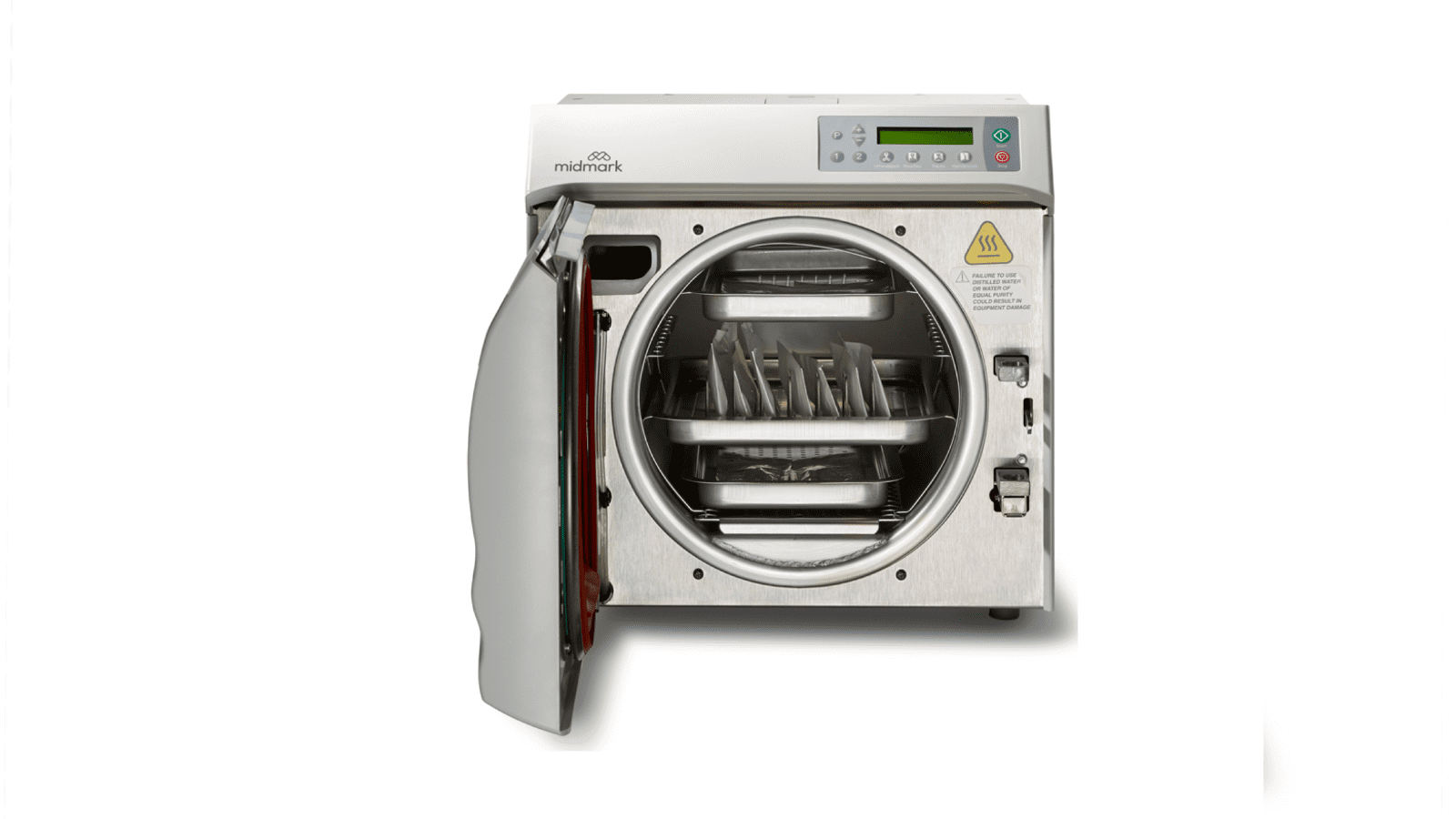
Product Description
The Midmark M11 UltraClave Steam Sterilizer is a top-rated, large-capacity autoclave designed for reliable, efficient sterilization in dental and medical settings. With pre-programmed cycles and intuitive controls, it simplifies the sterilization process while maximizing throughput.
Product Overview
Recognized as DentalTown’s Best Infection Control Sterilizer Company of 2019, the M11 combines advanced features with user-friendly design. Its steam-flush pressure pulse air removal system ensures optimal steam penetration, while its 11″ diameter x 18″ deep chamber accommodates large loads. The built-in programmable settings allow full control over cycle time, temperature, drying, and venting.
Key Features
- Large 11″ x 18″ chamber for high-capacity sterilization
- Pre-programmed cycles for fast, consistent operation
- Programmable controls for exposure time, temperature, drying, and venting
- Steam-flush pressure pulse air removal for complete steam penetration
- Easy-access reservoir fill and drain ports
- Intuitive LCD display and control panel
- Designed for dental and medical use
Common Applications
- Sterilization of dental instruments, surgical tools, and reusable equipment
- High-volume practices requiring fast, reliable autoclave cycles
- Routine infection control in clinical environments
Technical Specifications
- Chamber Size: 11″ diameter x 18″ deep
- Sterilization Type: Steam
- Control System: Programmable cycles
- Display: LCD with soft-touch buttons
- Manufacturer: Midmark Corporation
Customer Ratings
5 out of 5 stars (based on 7 reviews on Net32)
Customer Feedback
- Highly reliable and very easy to use—perfect for our busy practice.
- Large chamber size is ideal for processing multiple trays at once.
Awards
- DentalTown Best Infection Control Sterilizer Company (2019)
Price
Net32 Price: $6,699.00
2. Tuttnauer ValueKlave 1730 Steam Sterilizer
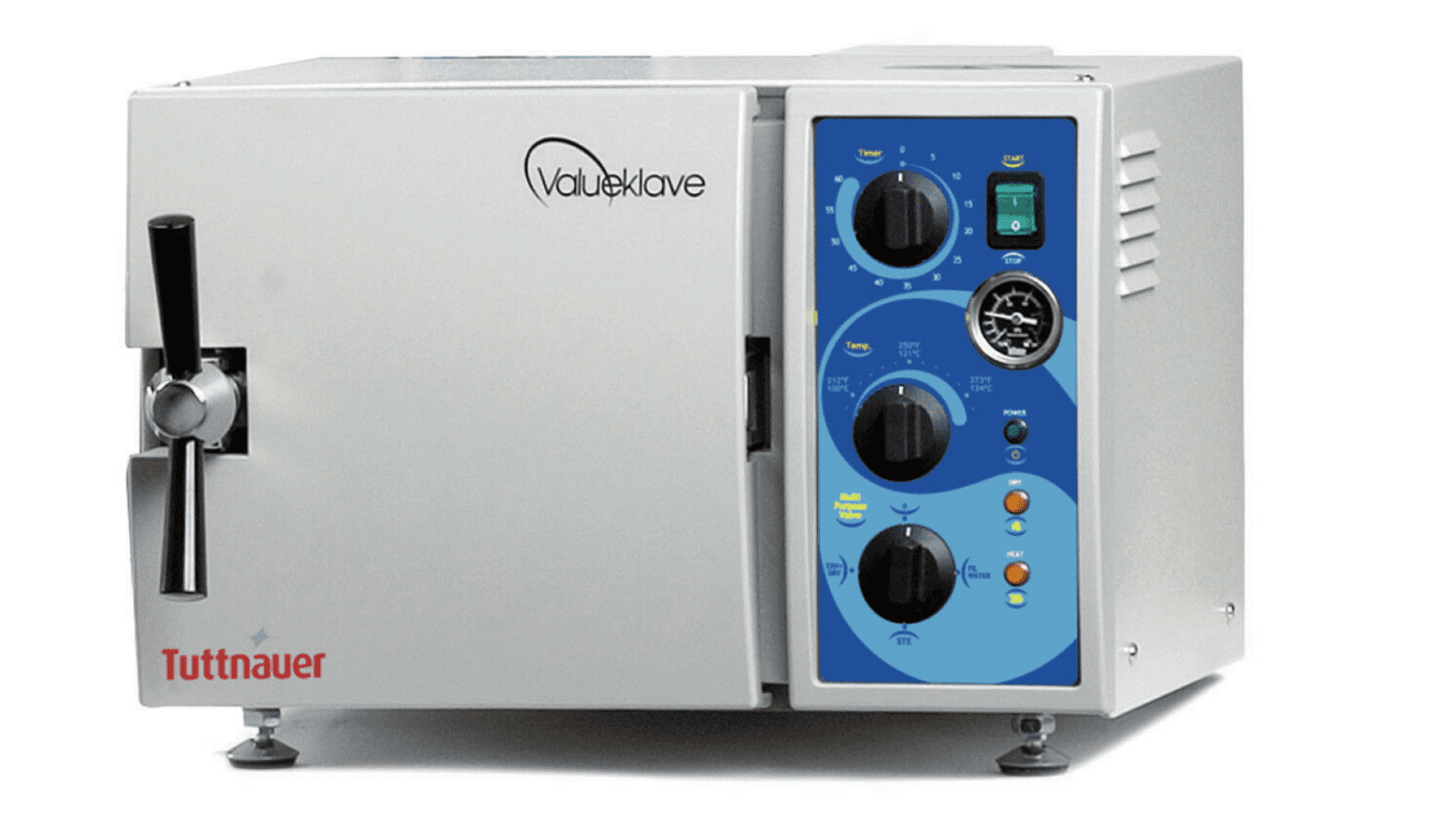
Product Description
The Tuttnauer ValueKlave 1730 Steam Sterilizer offers efficient, compact sterilization for small practices and operatory setups. Designed for speed, safety, and ease of use, it delivers reliable performance in a durable, space-saving form.
Product Overview
With an 11-minute unwrapped cycle time (from a hot start), the ValueKlave streamlines sterilization without sacrificing effectiveness. Its colorful, intuitive control panel simplifies operation, while safety features like a dual thermostat and automatic shut-off provide reliable protection. A safe-locking door maintains chamber pressure, and a durable, polished chamber ensures long-term performance.
Key Features
- Compact size ideal for smaller practices
- 11-minute unwrapped cycle from hot start
- Colorful, easy-to-use control panel
- Dual safety thermostat and automatic shut-off
- Safe-locking door maintains maximum chamber pressure
- Easy-to-access reservoir for convenient drainage
- Polished, durable chamber construction
Common Applications
- Rapid sterilization of small instrument sets
- Ideal for general dental, hygiene, or operatory use
- Backup or supplemental sterilizer for busy clinics
Technical Specifications
- Sterilization Type: Steam
- Cycle Time: 11 minutes (hot start, unwrapped)
- Safety Features: Dual thermostat, auto shut-off
- Display: Color-coded control panel
- Manufacturer: Tuttnauer USA Co Ltd
Customer Ratings
5 out of 5 stars (based on 2 reviews on Net32)
Customer Feedback
- Great for smaller loads and fast cycles—reliable and compact.
- Perfect addition to our hygiene room—easy to operate and maintain.
Price
Amazon Price: $2,239.00
3. Midmark M9 UltraClave Steam Sterilizer
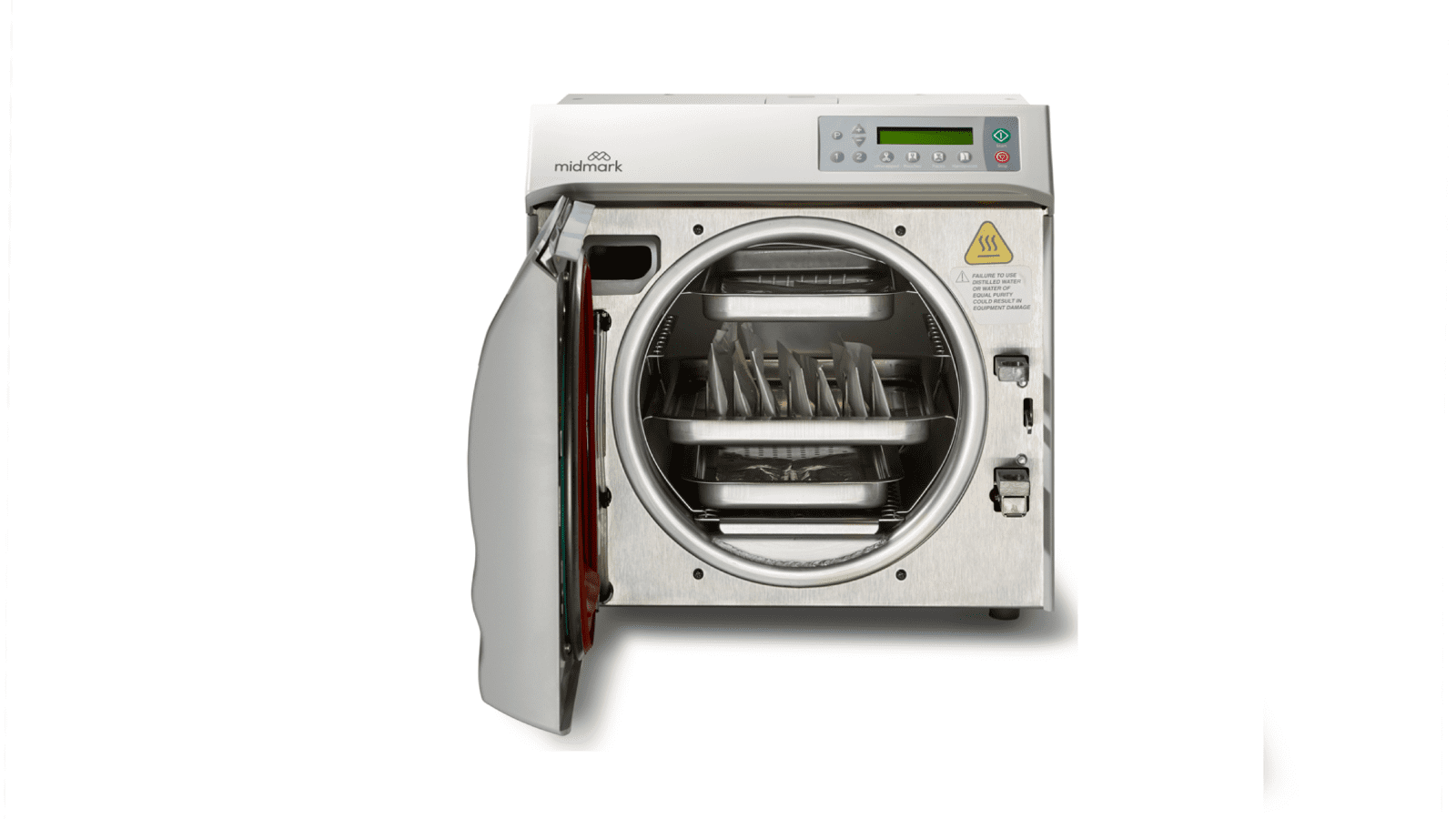
Product Overview
As the predecessor to the M11, the M9 features a slightly smaller chamber (9″ x 15″) while retaining advanced capabilities. It includes a built-in LCD display that prompts cycle information, exposure time, and temperature. The steam-flush pressure air removal system improves drying time and ensures complete steam penetration. Its customizable cycle settings allow full control over time, temperature, venting, and dry duration.
Key Features
- 9″ x 15″ stainless steel chamber ideal for routine sterilization
- LCD display for cycle prompts and temperature tracking
- Programmable settings for exposure time, vent speed, and dry cycle
- Steam-flush pressure air removal system for improved drying
- Compact footprint with high-efficiency performance
- Trusted Midmark quality and durability
Common Applications
- Routine sterilization of dental and medical instruments
- Practices with moderate sterilization needs
- Infection control in operatories or small clinics
Technical Specifications
- Chamber Size: 9″ diameter x 15″ deep
- Sterilization Type: Steam
- Control System: Programmable cycles with LCD display
- Manufacturer: Midmark Corporation
Customer Ratings
5 out of 5 stars (based on 5 reviews on Net32)
Customer Feedback
- Perfect size for daily sterilization—powerful and space-saving.
- We love the cycle customization—it makes scheduling a breeze.
Price
Net32 Price: $6,300.00
4. Bader 12 L Class B Autoclave
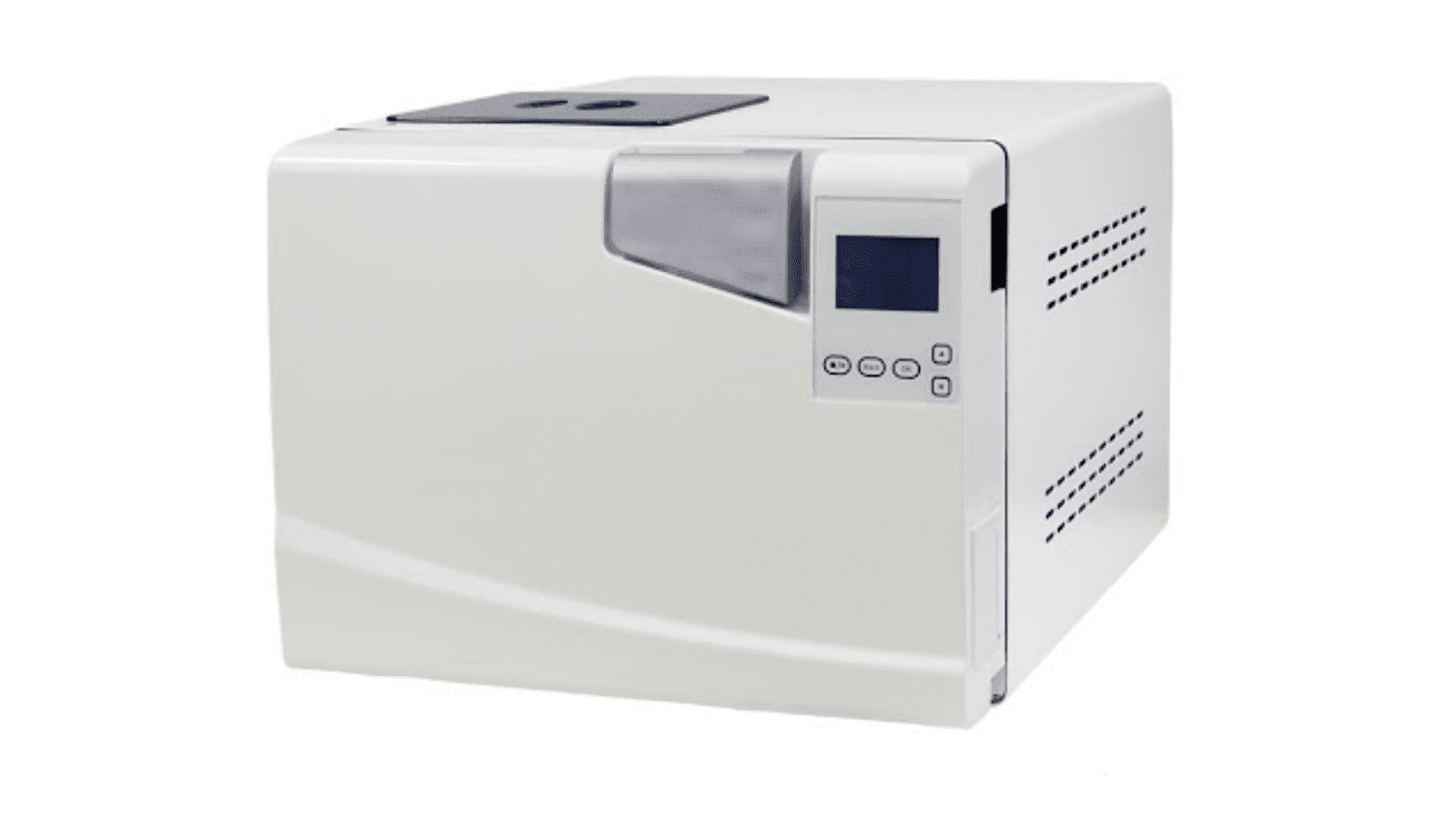
Product Description
The Bader 12 L Class B Autoclave is a compact, regulation-compliant sterilizer designed to meet essential infection control needs in clinical settings. Equipped with a microprocessor and safety-focused features, it offers reliable, easy-to-use sterilization functionality.
Product Overview
Ideal for practices seeking a simple yet effective sterilization solution, this autoclave includes a self-diagnostic system to detect overheating and overpressure. Its built-in condensed water collector helps prevent steam contamination, and a drying cycle ensures instruments are ready for use post-sterilization. The unit also features a USB port for data logging and a safety sensor to monitor operational status.
Key Features
- 12-liter capacity Class B autoclave
- Microprocessor-controlled interface with simple navigation
- Self-diagnosis functions for pressure and temperature safety
- Built-in condensed water collector to reduce steam pollution
- Integrated drying cycle at the end of each sterilization process
- USB port for cycle data export
- Security sensor for additional safety monitoring
- Compliant with European sterilization standards
Common Applications
- General sterilization of dental instruments and handpieces
- Practices requiring Class B sterilization performance in a compact form
- Clinics adhering to European sterilization protocols
Technical Specifications
- Chamber Capacity: 12 liters
- Sterilization Type: Steam, Class B
- Control System: Microprocessor with USB output
- Safety Features: Overheat/overpressure self-diagnosis, sensor monitoring
- Manufacturer: Bader
Customer Feedback
- Reliable daily use autoclave with intuitive controls.
- Meets our basic needs and fits well in smaller clinics
5. Mocom Supreme Closed Circuit Autoclave
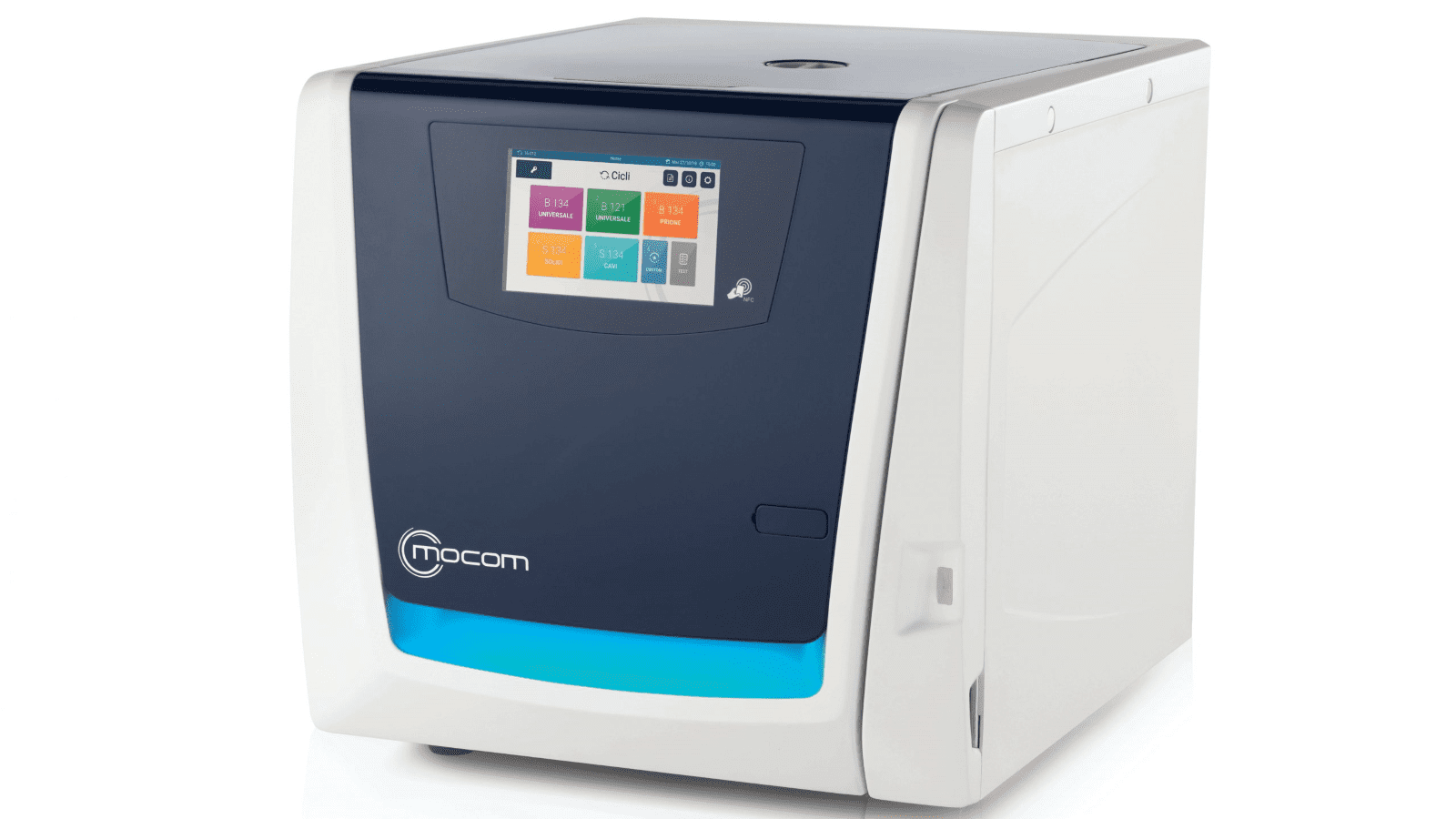
Product Description
The Mocom Supreme Closed Circuit Autoclave is a high-efficiency, eco-conscious sterilizer that operates using an internal filtration and water recycling system. Designed for modern dental clinics, it reduces water consumption, waste, and operational costs without compromising performance.
Product Overview
With just 5 liters of water, the Mocom Supreme can perform up to 50 sterilization cycles by recycling approximately 100 ml per cycle through a nano-ceramic re-circulation filter. The unit features advanced digital tools including a 7″ touchscreen interface, integrated WiFi, a USB port, and a memory card for diagnostics and data tracking—offering a smart, connected sterilization solution.
Key Features
- Closed-circuit system recycles water for up to 50 cycles with 5 liters
- Nano-ceramic filtration for water purification and reuse
- Reduces waste, operational costs, and water consumption
- 7″ touchscreen for intuitive operation
- Built-in WiFi, USB port, and memory card for diagnostics and data logging
- Highly efficient and environmentally friendly design
Common Applications
- Eco-friendly dental clinics focused on sustainability
- Practices requiring high-capacity, low-consumption sterilization
- Advanced facilities needing smart data integration and diagnostics
Technical Specifications
- Water Consumption: ~100 ml per cycle (closed circuit system)
- Display: 7″ touch screen
- Connectivity: WiFi, USB, memory card
- Filter Type: Nano-ceramic re-circulation filter
- Manufacturer: Mocom
- Sterilization Type: Steam, closed circuit
Customer Ratings
Not Yet Rated on Dentaltix
Customer Feedback
- Innovative and eco-efficient—cut our water use dramatically.
- Smart interface and low maintenance make this autoclave stand out.
Price
Dentaltix Price: €5,197.50
